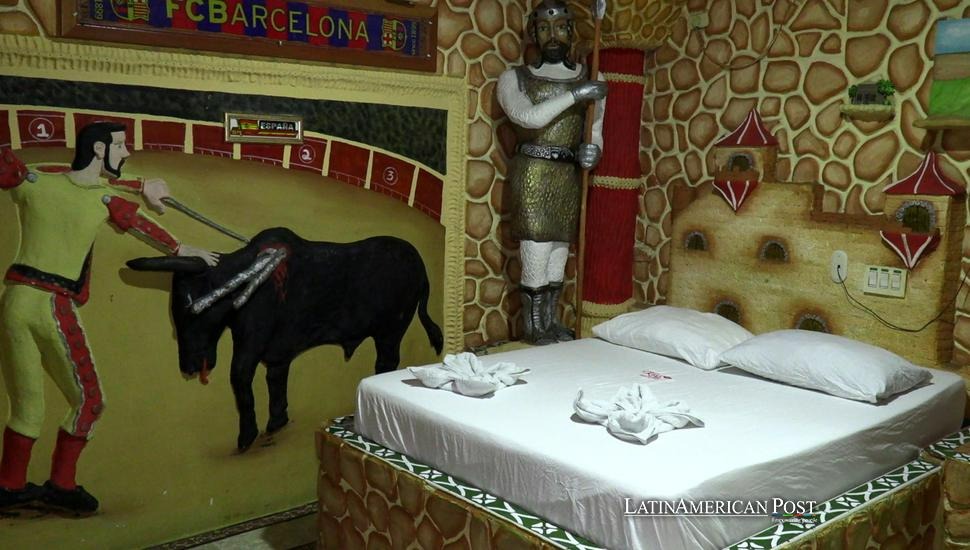Colombia’s Unique’ Temple for Making Love’ Welcomes Biodiversity

As hotel space in Cali, Colombia, filled up ahead of COP16, the themed motels were able to step in and fill the gap — a reminder of the cultural importance of motels in Latin America as spaces of romance, rest, and now, biodiversity diplomacy.
Motels in Latin America vs. the United States
Unlike the U.S. version, Latin American motels, which connote cheap, often itinerant accommodation, have courtyards and private rooms with themed decors designed to communicate privacy, intimacy, and romance. Of course, this difference in meaning becomes stark in people’s imaginations when non-certified sites have spent their time preparing for visitors: Argentina could be losing money preparing apartment rooms for tourists to replace the illegally certified whales used to inform other estimates. In late 2010, Cali, Colombia, hosted COP16, the most significant biodiversity summit in history. Accommodations quickly filled up since it was Latin America’s first time hosting a COP. As it turned out, the city’s many themed motels became an unexpected but practical solution.
This Latin American tradition is perpetuated by the famous hotel El Paraiso, with almost 200 themed suites — nearly all of which have been visited by starry-eyed couples. Humberto Villegas, the motel’s owner, built the multi-street showplace because when he started the business from scratch, I wanted it to be like a temple of love.’ He added: ‘Building those rooms has meant I can match a fantasy that the customers might have, such as a person who searches for an African jungle to come together in a jungle room.’ Over the past few weeks, COP16 guests have been staying in El Paraiso, the latest side trip to add color to the conference as delegates take the Party to Cali. Rooms are themed around various places in Colombia — such as Pasto, Cartagena, or the Amazon — and there are even an Egyptian- and a Persian-themed suite. When diplomats can, they live like the starry-eyed couples who have visited before them, taking their meetings in Villegas’ vision of a motel as an escape from reality.
Filling the Accommodation Gap for COP16
COP16’s nearly 60,000 participants also signaled to Cali’s civic and business leaders the urgent need to improve the city’s capacity for international events. Hotels in town quickly filled, and tight budgets prompted delegations to take over motels. ‘Cali isn’t ready for these numbers of people for an event of this magnitude,’ explained Villegas. ‘The motels stepped in to make people feel at home by offering them an affordable and open alternative.
‘People [at COP16] did not expect to be in a motel,’ Villegas told me. ‘But most of them are curious and ask for a tour. Then, they share their experience on Facebook, Twitter, or Snapchat. “I have never been in a motel in my life, and they stayed here, and they liked it.”‘ (In an interesting twist, the pop singer Beyoncé used a Venezuelan brothel-themed motel, Sexyland, in her 2013 video for the song’ Yoncé’.) About 90 percent of Cali’s motels are tightly concentrated in the city’s south, and prices range from 35,000 pesos ($8) for the basics to 250,000 pesos ($56) for the extravagant ones. At the ‘Kiss Me’ motel, attendees who stayed found themselves in opulent-themed rooms surrounded by gurgling waterfalls, nature soundtracks, and elaborate mock Pythian portraits of reclining women. At the same time, other lamp-lit adventures included a recreation of Venus de Milo. Some guests even asked if they could take pictures of the decor from their rooms, which was a unique attraction.
A ‘Temple of Love’ and Cultural Hub
Villegas, who has always had a personal vision for the ‘Kiss Me’ motel as a place for affection and romance, considers the motel a mission. ‘It’s not just a business,’ he explained. ‘A motel exists so people can make love there. Making love is sacred and should be done in a cozy, beautiful place that stimulates connection and intimacy.’ Villegas’s approach is characteristically Latin American.
Since Cali is a city where salsa dancing and a leisurely attitude toward nightlife make it feel romantic, Villegas thinks that local culture adds to the appeal of motels. ‘The party culture of Cali often leads to something more,’ he told me. ‘Having a night of dancing was natural to top off with romance, to go to a motel.’ His inclusive motel approach — selling rooms to locals and anger management attendees — points to a local openness about relationships and privacy, something many Colombians feel easily and naturally. For their hardships and unattractiveness, even those at the anger management conference splurged on room service steaks and beers and incensed each other to boasts and a truce. If Villegas was surprised by their reaction, at least it would show them an open side of Cali.
A Personal Commitment to Biodiversity and Climate Change
While perhaps an unusual stage for these concerns, involvement in COP16 was a natural extension of Villegas’ environmental interests. He calls himself a ‘biodiversity entrepreneur’ and is one of Mexico’s most outspoken citizen activists on the danger of climate change. His day job as a motel owner doesn’t appear to fit into the category of ‘environmentalist,’ but Villegas saw the summit as an opportunity to make a public stand. ‘The natural world is in danger of being destroyed. We need forests to produce oxygen. There won’t be water for us in a few years. Species are disappearing…’
‘I hope there will be real commitments here, and ones that allow us to take action immediately,’ Villegas said, adding that community-level efforts at motels such as ‘Kiss Me’ could make a more significant difference. ‘This summit has to result in real steps forward against climate change, or the impacts will only get worse, and it is up to everyone to do something,’ he said. For Villegas, the motivating climate talks at COP16 also brought him closer to the decision-makers. They made him feel even more ‘obligated’ to the planet by continuing his ‘temple of love’ green.
The Future of Latin American Motels and Tourism
What Cali’s ‘Kiss Me’ motel shows us is that, like plants or people, Latin American motels don’t just serve a function. They can also embody the spirit of their times, not just in terms of the privacy they offer or the romantic and potentially illicit transactions they facilitate, but in the form of the social and communal ethic of hospitality. With ‘Kiss Me,’ motels were adapting to a new kind of guest even as they were introducing the international guests of COP16 to a part of the region’s culture. Such motels might yet become symbols of the new Latin America – not just because the area is growing as a tourist destination, but because, more than high-rise hotels and resort-filled coastal destinations, motels can offer both tourists and locals a warm, private place.
Also read: Tourists Can Escape the Crowds and Discover Mexico’s Underrated Pacific Coast
Motels are a matter of course for residents of cities such as Cali, where general cultural openness and hospitality exist as a way of life. The motel experience at COP16 might provide a model for more events in the future. If so, the motel fulfills a practical need for affordable, easy access to reasonable comfort. As Villegas told me: ‘We do our best to make people feel welcome. Our motels are not just for Cali citizens but for everybody.




